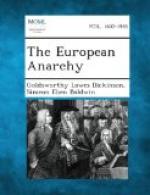A similar impression is given by the dispatch from M. Cambon, French Ambassador to Berlin, written on July 30, 1913.[4] He, too, finds elements working for war, and analyses them much as Baron Beyens does. There are first the “junkers,” or country squires, naturally military by all their traditions, but also afraid of the death-duties “which are bound to come if peace continues.” Secondly, the “higher bourgeoisie”—that is, the great manufacturers and financiers, and, of course, in particular the armament firms. Both these social classes are influenced, not only by direct pecuniary motives but by the fear of the rising democracy, which is beginning to swamp their representatives in the Reichstag. Thirdly, the officials, the “party of the pensioned.” Fourthly, the universities, the “historians, philosophers, political pamphleteers, and other apologists of German Kultur.” Fifthly, rancorous diplomatists, with a sense that they had been duped. On the other hand, there were, as M. Cambon insists, other forces in the country making for peace. What were these? In numbers the great bulk, in Germany as in all countries. “The mass of the workmen, artisans and peasants, who are peace-loving by instinct.” Such of the great nobles as were intelligent enough to recognize the “disastrous political and social consequences of war.” “Numerous manufacturers, merchants, and financiers in a moderate way of business.” The non-German elements of the Empire. Finally, the Government and the governing classes in the large southern States. A goodly array of peace forces! According to M. Cambon, however, all these latter elements “are only a sort of make-weight in political matters with limited influence on public opinion, or they are silent social forces, passive and defenceless against the infection of a wave of warlike feeling.” This last sentence is pregnant. It describes the state of affairs existing, more or less, in all countries; a few individuals, a few groups or cliques, making for war more or less deliberately; the mass of the people ignorant and unconcerned, but also defenceless against suggestion, and ready to respond to the call to war, with submission or with enthusiasm, as soon as the call is made by their Government.
On the testimony, then, of these witnesses, all shrewd and competent observers, it may be permitted to sum up somewhat as follows:—
In the years immediately preceding the war the mass of the people in Germany, rich and poor, were attached to peace and dreaded war. But there was there also a powerful minority either desiring war or expecting it, and, in either case, preparing it by their agitation. And this minority could appeal to the peculiarly aggressive form of patriotism inculcated by the public schools and universities. The war party based its appeal for ever fresh armaments on the hostile preparations of the Powers of the Entente. Its aggressive ambition masqueraded, perhaps even to itself, as a




